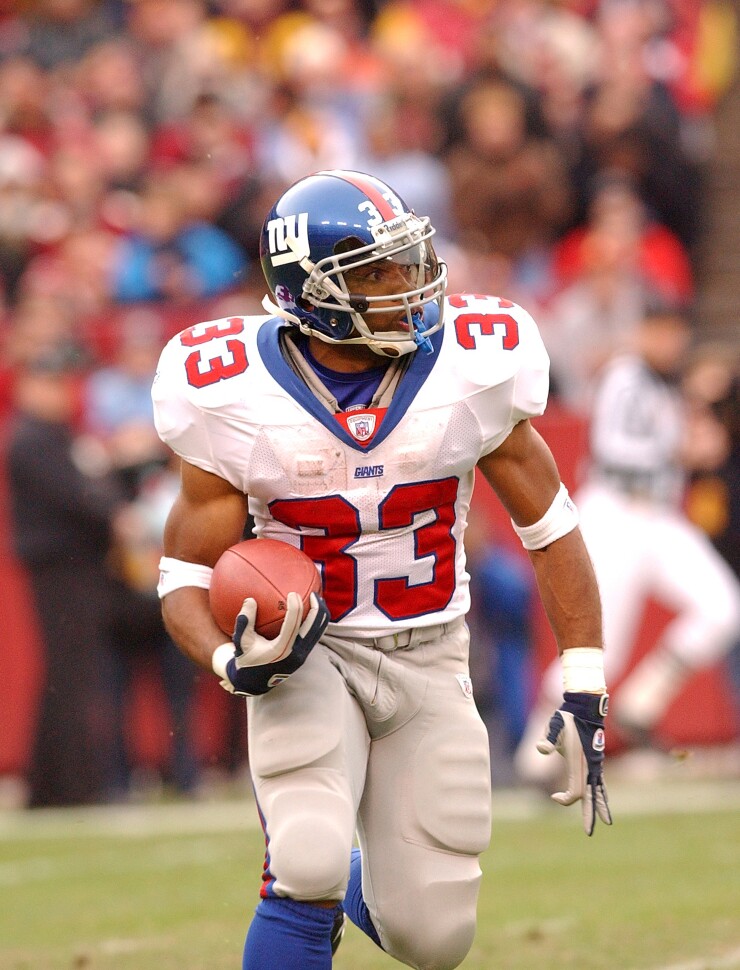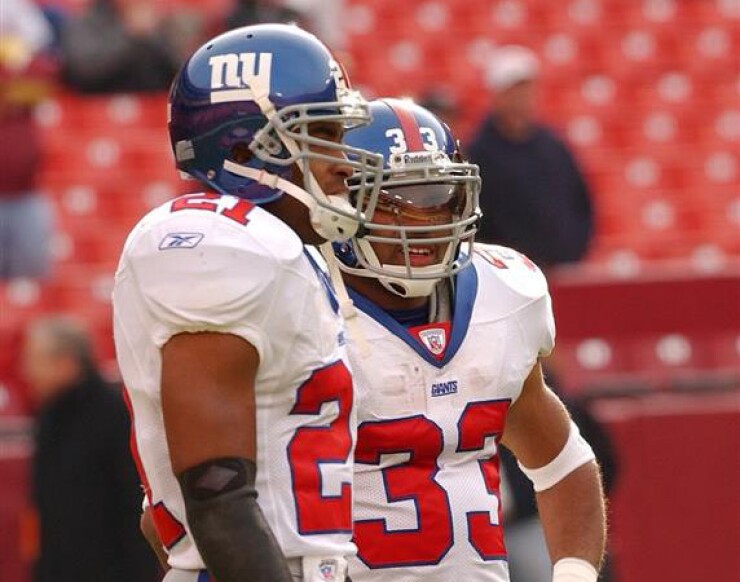When Delvin Joyce got his first check from the New York Giants, he was overwhelmed.
"In one paycheck I saw more money than I had ever seen in my entire life," he recalled.
The year was 2002, and Joyce was a 23-year-old return specialist for the Giants. He had taken an unconventional path to his dream job — after graduating from James Madison University, where he played college football, he spent a year as an insurance agent for the financial firm John Hancock. From his cubicle, he sent his résumé and highlight reel out to all 32 NFL teams. Only the Giants called him back.
Even with his background in finance, Joyce found his new NFL salary bewildering. Every week for the 17 weeks of the season, he received a check for upward of $21,000 — and then for the rest of the year, he got nothing. But for those 17 weeks, the money burned a hole in his pocket.
"There was a lot of temptation," Joyce said. "I would literally go to Best Buy and spend a good 20% of that paycheck on all these gadgets that I could never afford before."
Luckily, Joyce learned to manage his finances better. In fact, after he retired from football three years later, he became a financial advisor at Prudential Advisors, part of the insurance giant
But the challenges Joyce faced are typical for professional athletes, who often find themselves earning millions of dollars at an age when they have almost no experience making financial decisions. The average age of an NFL player, for example, is 26, according to the sports betting website
It's a mismatch that many financial advisors are familiar with.
"Professional athletes have, on the whole, a dismal record for creating or maintaining wealth," said David Demming, the chief investment officer of

A different approach
To solve these problems, Drew Hawkins created
"We call ourselves financial coaches," Hawkins said. "We're brought in by teams, leagues and unions to educate and equip these individuals to make better decisions and have a better understanding around all of what they do."
Edyoucore is not an advisory firm — it does not provide financial advice, sell financial products or even refer athletes to financial advisors. What it does provide is education. Its programs include financial literacy seminars, one-on-one coaching and a personal audit called a
READ MORE:
But perhaps Edyoucore's most important offering is the chance to meet former athletes, some of whom have learned financial lessons the hard way.
"They are one of them," Hawkins said. "Being able to hear somebody who has had some of the issues and challenges that you've dealt with talk about their story makes a huge difference."
Edyoucore arranges for these sports alumni to meet with young athletes in
"It's storytelling, but it's also having someone that's going to give you some of their real perspective," Hawkins said.
The mentors who take part in these meetings include some big names. Among them are NBA veterans Greg Oden, Rory Sparrow and Antoine Walker, who enjoyed a long and successful career but declared bankruptcy in 2010. Today he tries to use his misfortunes for good.
"When I teamed up with Edyoucore I thought I could help a lot of guys out if they heard how I made my mistakes," Walker said in a testimonial on Edyoucore's website. "I could be part of the solution and make sure they don't make the same money mistakes I did."

New horizons
In addition, Edyoucore is now expanding into new territory: mental health. This month, the company unveiled
"Edyoucore's ability to be relatable and innovative in its programming has proven to be extremely valuable in our player seminars," Jameel McClain, the Ravens' director of player development, said in a
READ MORE:
One of those new classes is called "'No' Is a Complete Sentence." Many athletes, as they face a sudden rush of new wealth, find themselves ambushed by friends and family members asking for money. Edyoucore's "No" class aims to help them set boundaries.
It's the kind of program that Joyce said he could have benefited from in his NFL days.
"There was often pressure on me to help family members financially, so a major challenge was balancing how much support I could afford to provide for others," he said. "The narrative that is often created about professional athletes is that they go broke because they are making bad investments or spending frivolously, when in reality, many of them have extended families and in some cases entire communities they are supporting."
To make matters even more complicated, sometimes these family members are the ones providing financial advice. Hawkins recalled a recent conversation in which he asked some young athletes who was handling their finances, and one replied, "My mom's got me covered."
Edyoucore does its best to steer them toward more professional sources. One of its classes is all about vetting and selecting financial advisors and accountants — or, as Hawkins put it, "getting the right people in those seats."
"We are 100% encouraging these individuals to go out and find these people to represent them," he said. "Having been in that space for 28 years myself, I know the importance of having a competent advisor and CPA working for you."
READ MORE:
Once they're in those seats, wealth managers can take it from there. But Edyoucore's goal is to get these 20-something NBA, NFL and MLB stars ready to become clients.
"We're getting them to talk about things that they historically haven't talked about," Hawkins said. "We try to normalize that conversation as much as we can."






